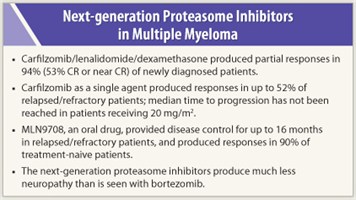The next-generation proteasome inhibitor carfilzomib is expected to gain FDA approval in the near future, offering a treatment option that may be as effective as and less neurotoxic than bortezomib (Velcade). Studies presented at the ASH Annual Meeting upheld benefits of the drug observed in earlier trials.
Phase II Carfilzomib Study
 Very promising response rates, and limited toxicity were observed when carfilzomib was combined with lenalidomide (Revlimid) and low-dose dexamethasone in a phase I/II study presented by Andrzej Jakubowiak, MD, of the University of Chicago Medical Center.1
Very promising response rates, and limited toxicity were observed when carfilzomib was combined with lenalidomide (Revlimid) and low-dose dexamethasone in a phase I/II study presented by Andrzej Jakubowiak, MD, of the University of Chicago Medical Center.1
“The carfilzomib/lenalidomide/dexamethasone regimen (CRd) is well tolerated and highly active, demonstrating rapid and deep responses in newly diagnosed myeloma,” Dr. Jakubowiak announced.
The study included 53 patients (median age 59) who received eight cycles of carfilzomib (at three different doses), lenalidomide, and dexamethasone, followed by at least nine additional cycles for maintenance. Stem cells were collected from the 24 patients who were autologous stem cell transplant candidates after completion of a median of five cycles. Only a few proceeded to transplant, and the majority, per protocol recommendations, continued on the CRd regimen after stem cell collection.
After one or more cycles of the triple regimen, 94% of patients experienced a partial response or greater, and 53% of these were complete or near-complete responses. After 12 treatment cycles, 79% achieved a complete or near-complete response. Responses were rapid, and patients continued to improve with additional treatment cycles. The high response rates were not affected by stage or cytogenetics.
“These response rates compare favorably to our best front-line regimens, and we’re still early in the course of the study. Responses continue to improve with time,” he said. “I think it’s going to be one of those regimens that will potentially change the landscape of what we can do.”
A total of 27 patients (55%) began maintenance therapy; 43 patients (88%) remain on treatment.
Other Carfilzomib Trials
In other phase II studies of carfilzomib presented at the ASH meeting, similar benefits were observed.

 A regimen of carfilzomib combined with thalidomide (Thalomid) and dexamethasone as induction therapy prior to stem cell transplantation and as consolidation therapy after transplant achieved responses in 84% of patients in the CARTHADEX study reported by Pieter Sonneveld, MD, PhD, of Erasmus Medical Center in Rotterdam, The Netherlands.2 After induction, 16% achieved a complete or stringent complete response, 29% a very good partial response, and 39% a partial response.
A regimen of carfilzomib combined with thalidomide (Thalomid) and dexamethasone as induction therapy prior to stem cell transplantation and as consolidation therapy after transplant achieved responses in 84% of patients in the CARTHADEX study reported by Pieter Sonneveld, MD, PhD, of Erasmus Medical Center in Rotterdam, The Netherlands.2 After induction, 16% achieved a complete or stringent complete response, 29% a very good partial response, and 39% a partial response.
“‘Carthadex’ induction is feasible and tolerable, and responses are rapid and equal to what is observed with bortezomib, thalidomide, and dexamethasone,” Dr. Sonneveld said, “but longer follow-up is needed for major conclusions.” He added that peripheral neuropathy occurred in only about one-fourth of patients.
Ravi Vij, MD, of Washington University School of Medicine, St. Louis, and colleagues studied carfilzomib as a single agent in relapsed/refractory patients not previously treated with bortezomib. They noted responses in 42% of patients who received 20 mg/m2 for all cycles and 52% of those receiving 20 mg/m2 during the first cycle followed by 27 mg/m2 for subsequent cycles.3 Median time to progression was 8.3 months in the first cohort but has not been reached in the group receiving the larger dose of carfilzomib.
MLN9708
 For several novel compounds still in early development for multiple myeloma, results were promising enough to be included in oral sessions at ASH. MLN9708 is an investigational proteasome inhibitor, the first oral drug in the class to enter clinical trials in myeloma. In early trials, it showed activity as a single agent and in combination regimens.
For several novel compounds still in early development for multiple myeloma, results were promising enough to be included in oral sessions at ASH. MLN9708 is an investigational proteasome inhibitor, the first oral drug in the class to enter clinical trials in myeloma. In early trials, it showed activity as a single agent and in combination regimens.
“This compound has similar selectivity and potency, dissociates from the proteasome faster, and has greater tissue penetration compared with bortezomib,” said Paul G. Richardson, MD, of Dana-Farber Cancer Institute, Boston, who has led some of the trials.
He reported the results of a phase I dose-escalation expansion cohort study that has enrolled 56 patients averaging 3.5 prior therapies, with 88% exposed to bortezomib.4 MLN9708 was given orally twice weekly in 21-day cycles. Of 46 patients evaluable for response, 6 achieved at least a partial response, including 1 complete response. One patient achieved a minimal response, and 28 patients experienced stable disease. Five responses occurred in patients previously exposed to bortezomib.
“All seven responding patients remain in remission, with disease control of up to 15.9 months,” Dr. Richardson said. “Preliminary data suggest there is activity in heavily pretreated relapsed/refractory myeloma, including durable responses and disease control.”
MLN9708 is also being evaluated on a weekly schedule, and in combination with lenalidomide and dexamethasone in previously untreated myeloma. A phase I/II study in this setting found that 9 of 10 treatment-naive patients achieved at least a partial response, including one complete and three very good partial responses.5 In addition, all patients had a 50% or greater reduction in M-protein after the first cycle, and no patients have yet had disease progression.
In the MLN9708 investigations, fatigue, thrombocytopenia, and nausea are the most common adverse events that have been reported. No peripheral neuropathy of grade 3 or higher has been reported, and dose reductions have not been necessary.
Marizomib
Also showing promise in early-phase development is marizomib (NPI-0052), a nonpeptide proteaseome inhibitor that is delivered via infusion. With a twice-weekly dosing schedule, a study in 20 relapsed/refractory patients receiving marizomib with or without dexamathasone demonstrated stable disease or better in 55%, and minimal or partial responses in 15%.6
In patients refractory to bortezomib, stable disease was achieved in 67% and a minimal or partial response in 17%. ■
Disclosure: Dr. Vij has served on the advisory board for Onyx. Dr. Richardson has served on advisory boards for Celgene, Millennium, Novartis, and Bristol-Myers Squibb. Dr. Sonneveld reported no potential conflicts of interest. Dr. Jakubowiak is a consultant, has received honoraria, and has served on an advisory board for Bristol-Myers Squibb, Millennium, and Onyx; he is a consultant for and has received honoraria from Celgene.
Expert Point of View: Next-generation Proteasome Inhibitors Will Improve Outcomes in Bortezomib-refractory Myeloma Patients
References
1. Jakubowiak AJ, Dytfeld D, Jagannath S, et al: Final results of a frontline phase 1/2 study of carfilzomib, lenalidomide, and low-dose dexamethasone in multiple myeloma. 53rd American Society of Hematology Annual Meeting. Abstract 631. Presented December 12, 2011.
2. Sonneveld P, Hacker E, Zweegman S, et al: Carfilzomib combined with thalidomide and dexamethasone (CARTHADEX) as induction treatment prior to high-dose melphalan in newly diagnosed patients with multiple myeloma. A trial of the European Myeloma Network. 53rd American Society of Hematology Annual Meeting. Abstract 633. Presented December 12, 2011.
3. Vij R, Kaufman JL, Jakubowiak AJ, et al: Final results form the bortezomib-naïve group of PX-171-004, a phase 2 study of single-agent carfilzomib in patients with relapsed and/or refractory MM. 53rd American Society of Hematology Annual Meeting. Abstract 813. Presented December 12, 2011.
4. Richardson PG, Baz R, Wang L, et al: Investigational agent MLN9708, an oral proteasome inhibitor, in patients with relapsed and/or refractory multiple myeloma: Results from the expansion cohorts of a phase I dose-escalation study. 53rd American Society of Hematology Annual Meeting. Abstract 301. Presented December 12, 2011.
5. Berdeja JG, Richardson PG, Lonial S, et al: Phase 1 / 2 study of oral MLN9708, a novel, investigational proteasome inhibitor, in combination with lenalidomide and dexamethasone in patients with previously untreated multiple myeloma. 53rd American Society of Hematology Annual Meeting. Abstract 479. Presented December 12, 2011.
6. Richardson PG, Spencer A, Cannell P, et al: Phase 1 clinical evaluation of twice-weekly marizomib (NPI-0052), a novel proteasome inhibitor, in patients with relapsed/refractory multiple myeloma. 53rd American Society of Hematology Annual Meeting. Abstract 302. Presented December 12, 2011.

 “The activity of MLN 9708 is very encouraging,” said Paul G. Richardson, MD, of Dana-Farber Cancer...
“The activity of MLN 9708 is very encouraging,” said Paul G. Richardson, MD, of Dana-Farber Cancer...